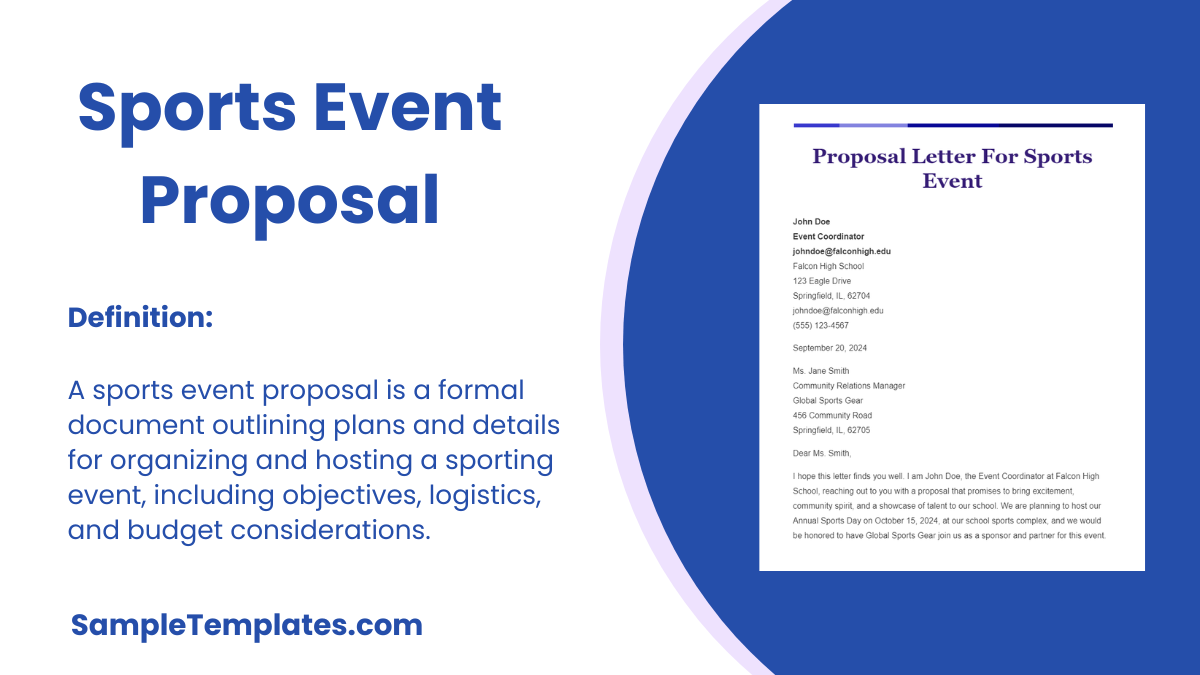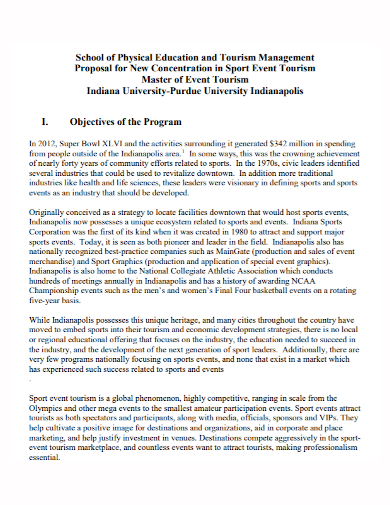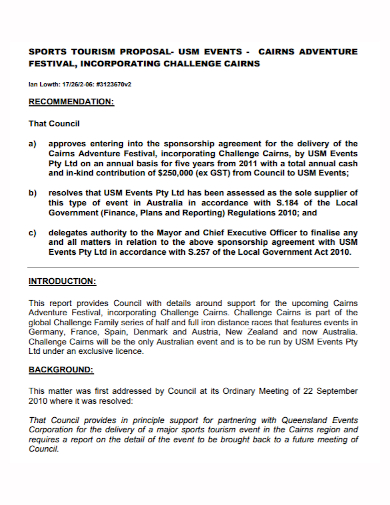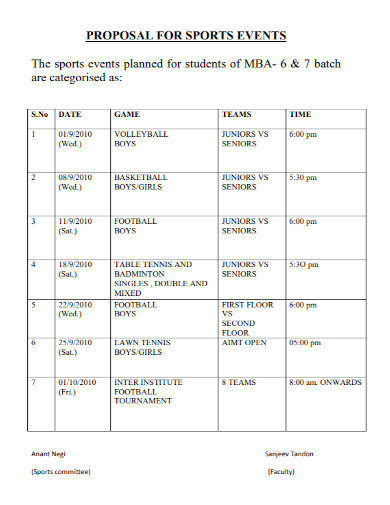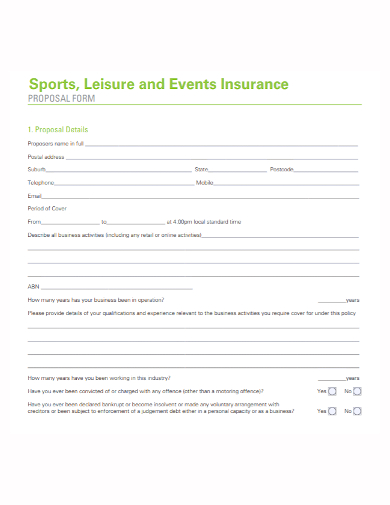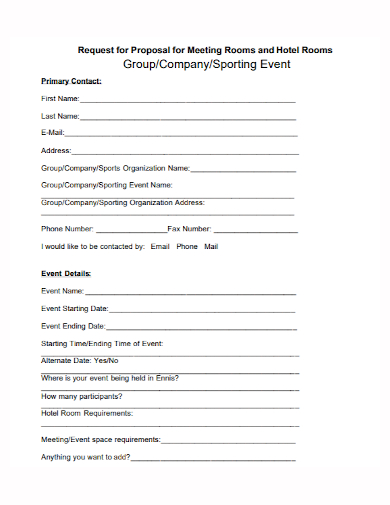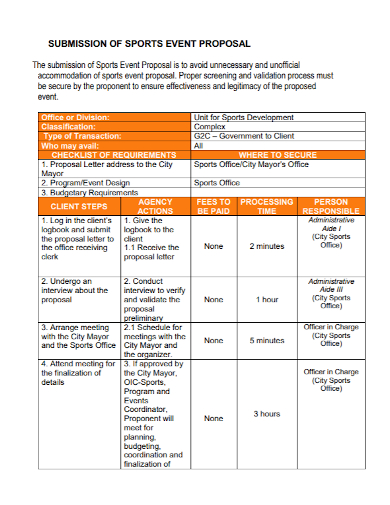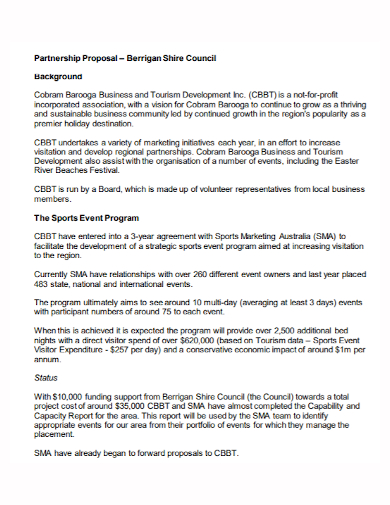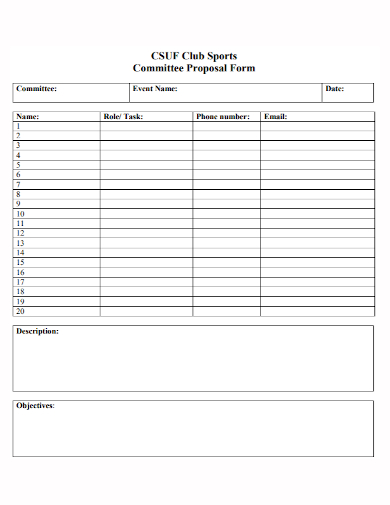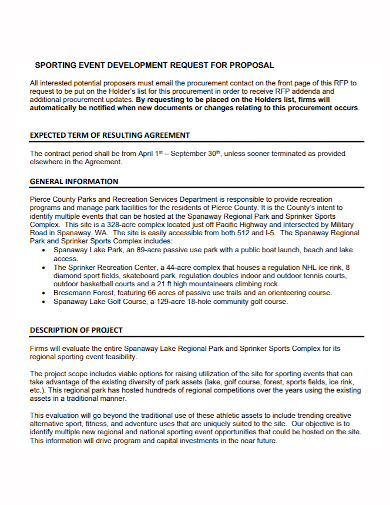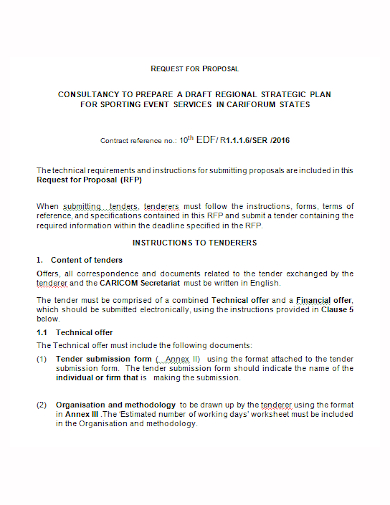Do you want to organize a sports event in your school or your community? Do you want to have a sports tournament that everyone can join? Organizing a sports event is a great way to gather people to do something fun and exciting, meet new people and forge friendships, and strengthen the sense of belongingness of the people in your school or community. Plus, it promotes an active lifestyle which is good for the health of everyone. Before you get to organize your sports event, you need a proposal to guide you on asking permission from the authorities to let you proceed with sample planning and implementing your event. Read the article to know how to write a sports event proposal.
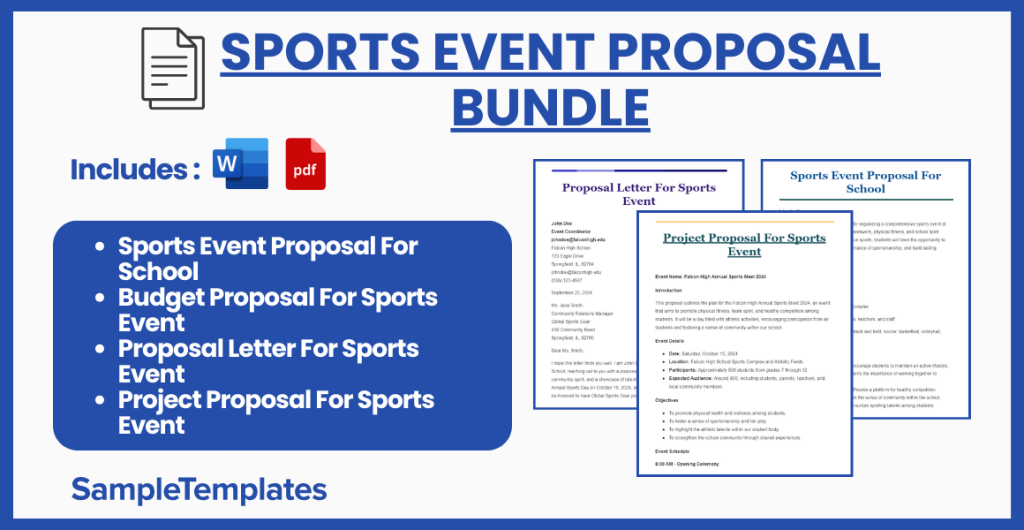
Download Sports Event Proposal Bundle
Sports Event Proposal For School
Introduction
We are excited to present a proposal for organizing a comprehensive sports event at our school. This event aims to foster teamwork, physical fitness, and school spirit among students. By engaging in various sports, students will have the opportunity to showcase their talents, learn the importance of sportsmanship, and build lasting memories.
Event Overview
Event Name: School Sports Fiesta
Date: [Insert Date]
Venue: School Grounds and Sports Complex
Participants: Students from all grades, teachers, and staff
Events: A variety of sports, including track and field, soccer, basketball, volleyball, badminton, and table tennis.
Objectives
- Promote Physical Fitness: Encourage students to maintain an active lifestyle.
- Foster Teamwork: Teach students the importance of working together to achieve common goals.
- Enhance Competitive Spirit: Provide a platform for healthy competition.
- Build School Spirit: Strengthen the sense of community within the school.
- Discover Talents: Identify and nurture sporting talents among students.
Proposed Schedule
Day 1: Opening Ceremony
- Welcoming remarks by the principal
- Parade of participants
- Lighting of the sports torch
- Exhibition matches
Day 2-4: Competitive Events
- Preliminary rounds for all sports
- Semi-finals for team sports
- Fun activities and games for non-participants
Day 5: Finals and Closing Ceremony
- Finals for all sports
- Award ceremony
- Closing remarks by the sports coordinator
- Farewell party
Budget Estimation
An estimated budget will cover equipment, refreshments, trophies and medals, event materials, and miscellaneous expenses. A detailed budget will be prepared upon approval of the event proposal.
Logistics and Preparations
- Venue Preparation: Ensure all sports facilities are in optimal condition.
- Equipment Check: Procure and check all necessary sports equipment.
- Registration Process: Open registration for all students wishing to participate.
- Volunteer Staff: Recruit teachers and senior students to help organize and run the event.
- Safety Measures: Arrange for medical staff and first aid services throughout the event.
Conclusion
The School Sports Fiesta promises to be a memorable event that will not only highlight our students’ athletic abilities but also enhance their personal development. By participating in this event, students will learn valuable life lessons in teamwork, perseverance, and sportsmanship. We look forward to your support in making this event a success.
Approval and Feedback:
We seek your approval to proceed with the detailed planning and organization of the School Sports Fiesta. Your feedback and suggestions are highly welcome to make this event beneficial and enjoyable for everyone involved.
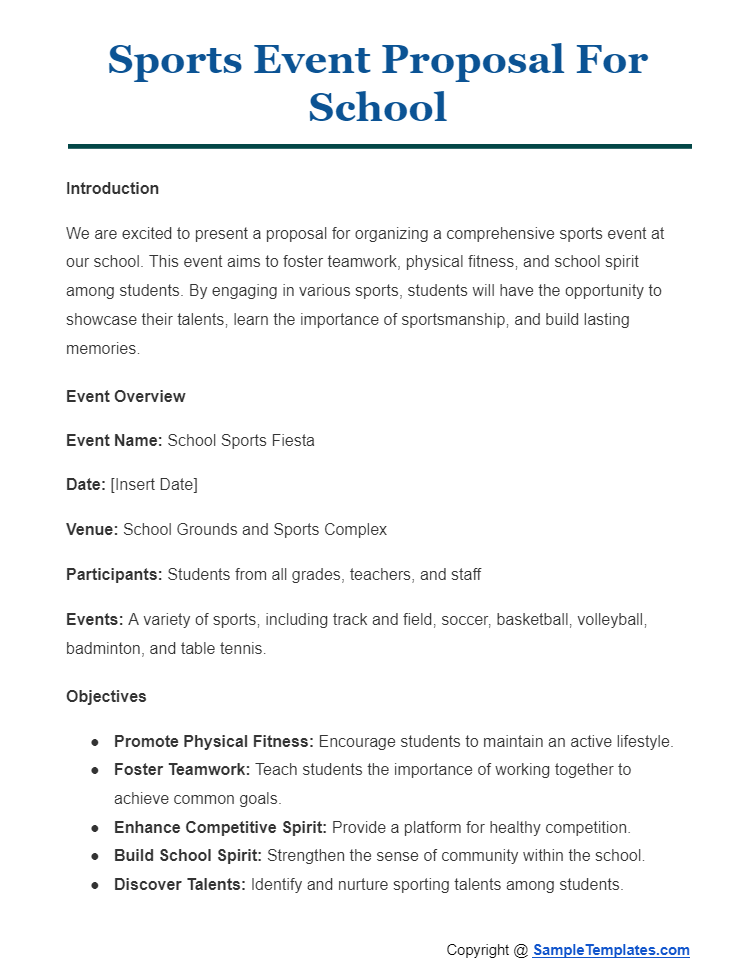
Budget Proposal For Sports Event
Introduction
This budget proposal outlines the anticipated expenses for organizing a successful sports event. The aim is to ensure that all aspects of the event are well-funded, from safety measures to awards, to create a memorable and engaging experience for all participants.
Event Details
- Event Name: [Event Name]
- Date: [Date]
- Location: [Location]
- Participants: [Number of Participants]
- Expected Audience: [Number of Spectators]
Budget Overview
The total estimated budget for the sports event is [Total Budget Amount]. Below is a breakdown of the major expense categories and their projected costs.
Budget Breakdown
- Venue and Equipment
- Venue Rental: $[Amount]
- Equipment Rental (e.g., balls, nets, racquets): $[Amount]
- Setup and Cleanup: $[Amount]
- Total: $[Amount]
- Safety and Health
- First Aid Kits: $[Amount]
- Medical Staff on Site: $[Amount]
- Sanitization Supplies: $[Amount]
- Total: $[Amount]
- Personnel
- Event Staff: $[Amount]
- Security Personnel: $[Amount]
- Referees/Umpires: $[Amount]
- Total: $[Amount]
- Marketing and Communications
- Posters and Flyers: $[Amount]
- Social Media Advertising: $[Amount]
- Program Printing: $[Amount]
- Total: $[Amount]
- Awards and Prizes
- Trophies and Medals: $[Amount]
- Certificates: $[Amount]
- Special Prizes (e.g., MVP, Best Sportsmanship): $[Amount]
- Total: $[Amount]
- Hospitality
- Refreshments for Participants: $[Amount]
- Water Stations: $[Amount]
- Meals for Staff and Volunteers: $[Amount]
- Total: $[Amount]
- Miscellaneous
- Emergency Fund: $[Amount]
- Transportation for Equipment: $[Amount]
- Signage: $[Amount]
- Total: $[Amount]
Total Estimated Budget
- Grand Total: $[Total Amount]
Conclusion
This budget proposal has been carefully prepared to cover all necessary expenses for hosting a successful sports event. It aims to ensure that the event is not only enjoyable but also safe and well-organized. We are open to adjustments based on further discussions with the event stakeholders and sponsors.
Approval:
We seek your approval to proceed with the funding and organization of the event as outlined in this budget proposal. Your support is crucial for its success, and we look forward to making this event memorable for all participants and spectators.
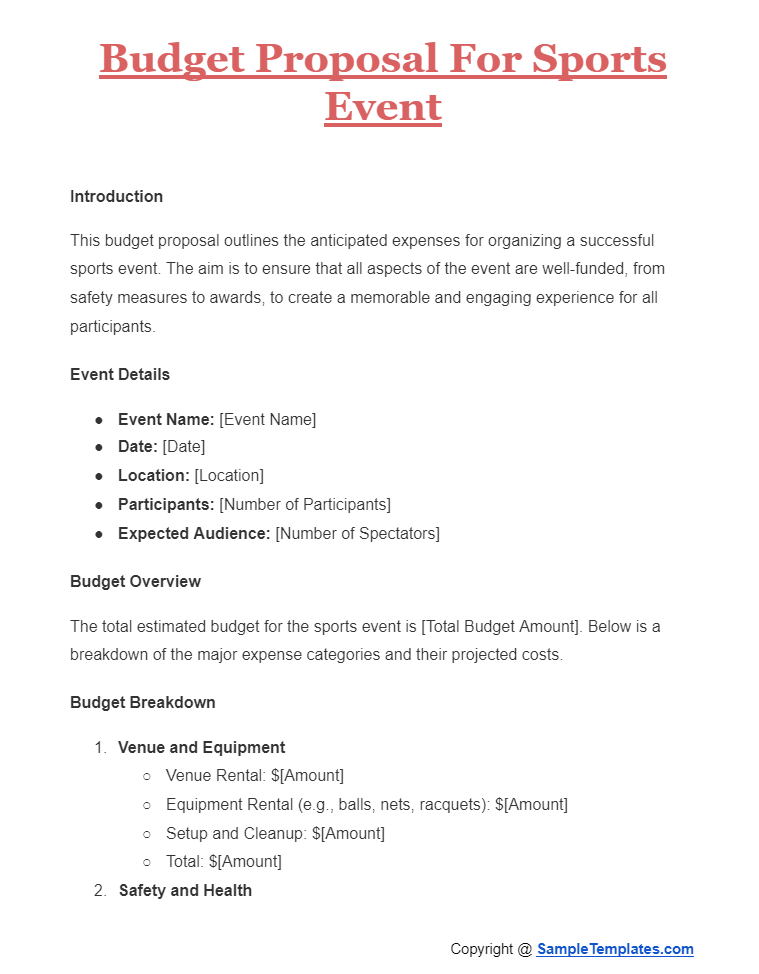
Proposal Letter For Sports Event
John Doe
Event Coordinator
[email protected]
Falcon High School
123 Eagle Drive
Springfield, IL, 62704
[email protected]
(555) 123-4567
September 20, 2024
Ms. Jane Smith
Community Relations Manager
Global Sports Gear
456 Community Road
Springfield, IL, 62705
Dear Ms. Smith,
I hope this letter finds you well. I am John Doe, the Event Coordinator at Falcon High School, reaching out to you with a proposal that promises to bring excitement, community spirit, and a showcase of talent to our school. We are planning to host our Annual Sports Day on October 15, 2024, at our school sports complex, and we would be honored to have Global Sports Gear join us as a sponsor and partner for this event.
Event Overview:
The Falcon High School Annual Sports Day is a celebrated tradition that brings together students from all grades to participate in a variety of athletic competitions, ranging from track and field events to team sports like soccer and basketball. This year, we anticipate over 500 student athletes will participate, with an expected audience of around 800 spectators, including students, faculty, family members, and members of the local community.
Sponsorship Opportunity:
By partnering with Falcon High School for this event, Global Sports Gear will have the opportunity to increase brand visibility among a large and engaged community audience. Your participation can include branding on event materials, announcements during the event, and the opportunity to set up a promotional booth or display.
Budget and Needs:
Our estimated budget for the event is $10,000, covering equipment, safety measures, awards, and refreshments. We are seeking a sponsorship of $5,000 to help cover these costs. In return, we offer prominent branding opportunities for Global Sports Gear throughout the event.
Conclusion:
The Falcon High School Annual Sports Day is not just about competition; it’s a day of unity, health, and fun. It offers an ideal platform for Global Sports Gear to demonstrate community support and engagement. We are excited about the possibility of partnering with you and would be happy to discuss this proposal further at your convenience.
Thank you for considering our proposal. We look forward to the opportunity to collaborate with Global Sports Gear to make the Falcon High School Annual Sports Day a memorable event for our students and the community.
Warm regards,
John Doe
Event Coordinator
Falcon High School
[email protected]
(555) 123-4567
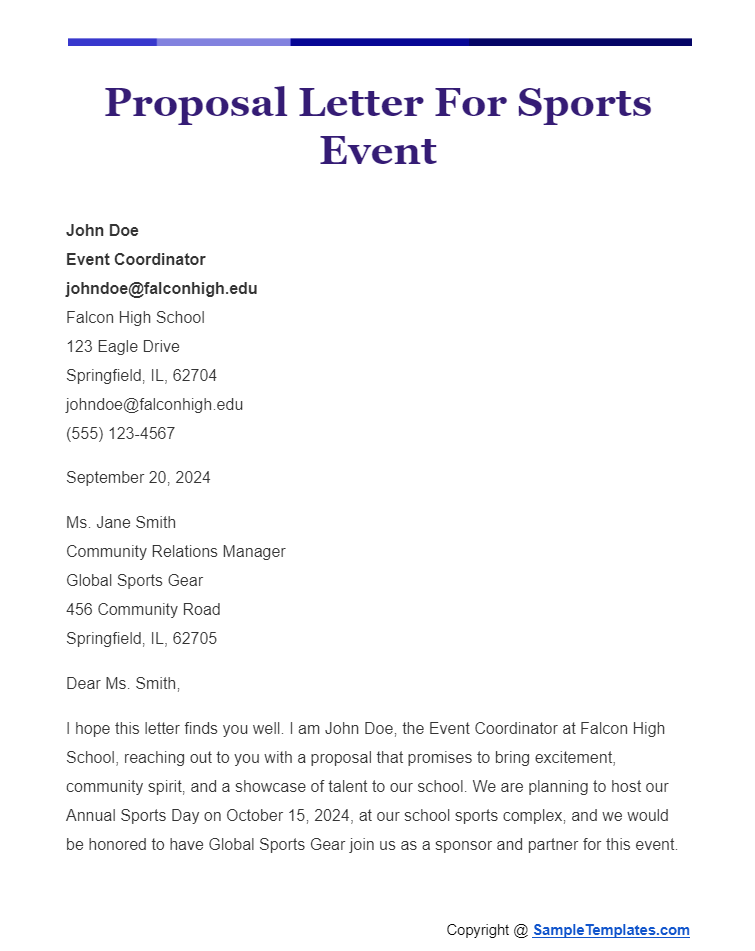
Project Proposal For Sports Event
Event Name: Falcon High Annual Sports Meet 2024
Introduction
This proposal outlines the plan for the Falcon High Annual Sports Meet 2024, an event that aims to promote physical fitness, team spirit, and healthy competition among students. It will be a day filled with athletic activities, encouraging participation from all students and fostering a sense of community within our school.
Event Details
- Date: Saturday, October 15, 2024
- Location: Falcon High School Sports Complex and Athletic Fields
- Participants: Approximately 500 students from grades 7 through 12
- Expected Audience: Around 800, including students, parents, teachers, and local community members
Objectives
- To promote physical health and wellness among students.
- To foster a sense of sportsmanship and fair play.
- To highlight the athletic talents within our student body.
- To strengthen the school community through shared experiences.
Event Schedule
8:00 AM – Opening Ceremony
- Welcome speech by the Principal
- Parade of athletes
9:00 AM – Track and Field Events
- 100m, 200m, 400m dashes
- Long jump, high jump
- Relay races
12:00 PM – Lunch Break
1:00 PM – Team Sports
- Soccer tournament
- Volleyball matches
- Basketball 3-on-3 tournament
5:00 PM – Award Ceremony
- Medal and trophy presentations
- Closing remarks by the Athletic Director
6:00 PM – Community BBQ
- Hosted on the school grounds for participants, families, and spectators
Budget Estimation
- Venue Preparation: $2,000 (Includes setting up athletic fields, seating, and temporary facilities)
- Equipment & Supplies: $1,500 (Sporting goods, first aid kits, and event materials)
- Marketing & Promotion: $500 (Posters, social media advertising, and local press releases)
- Awards & Prizes: $1,000 (Medals, trophies, and certificates for participants)
- Food & Beverages: $2,000 (Lunch for participants and BBQ supplies)
- Miscellaneous: $1,000 (Contingency fund for unforeseen expenses)
Total Estimated Budget: $8,000
Funding and Sponsorship
We seek sponsorship from local businesses and school funds to cover the costs associated with this event. In return, sponsors will receive advertising opportunities at the event and in all promotional materials.
Conclusion
The Falcon High Annual Sports Meet 2024 promises to be an exciting and inclusive event, offering students a platform to showcase their athletic talents and the school community an opportunity to come together. We believe this event will create lasting memories for our students and foster a positive school spirit. We kindly request your support and approval to proceed with the planning and execution of this event.
Approval and Feedback:
Your support and feedback are invaluable to us as we aim to make the Falcon High Annual Sports Meet 2024 a success. Please share your thoughts and confirm your approval at your earliest convenience.
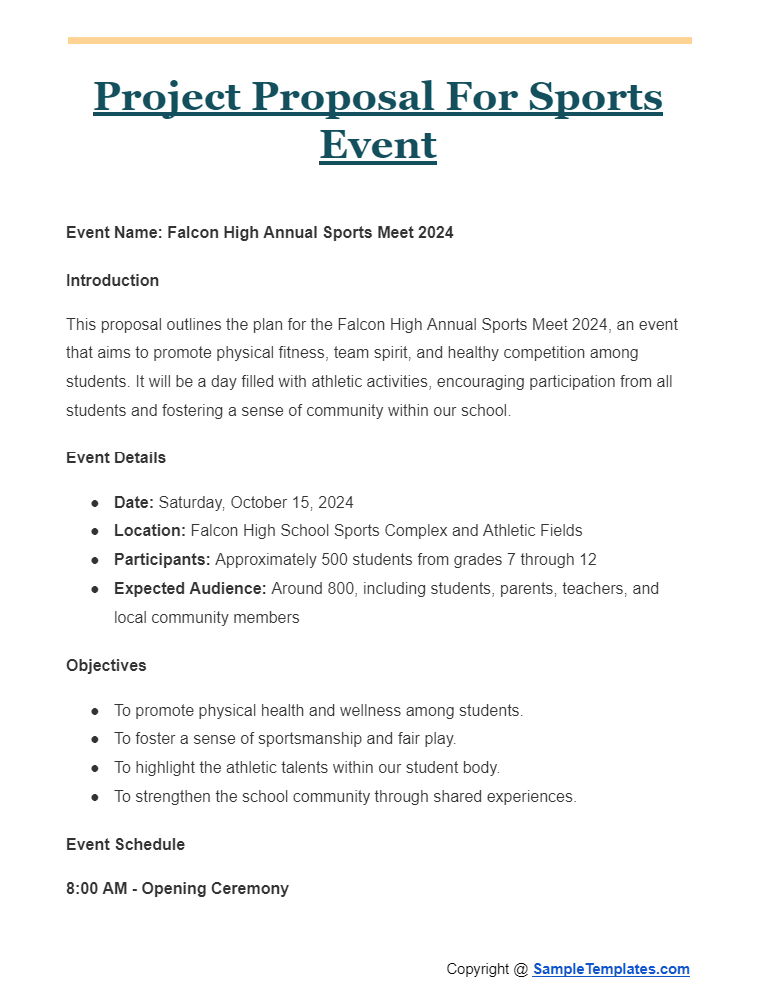
Browse More Templates On Sports Event Proposal
1. Sports Proposal
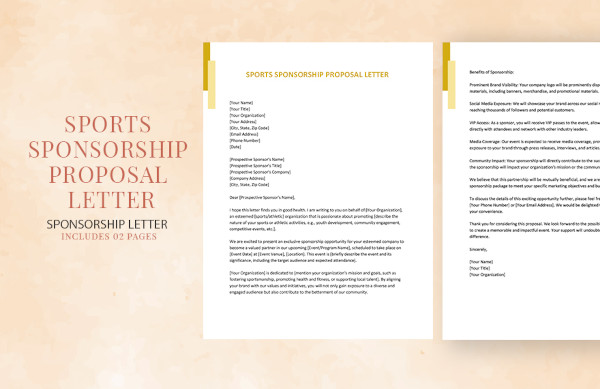
2. Sports Event Proposal Sample PDF
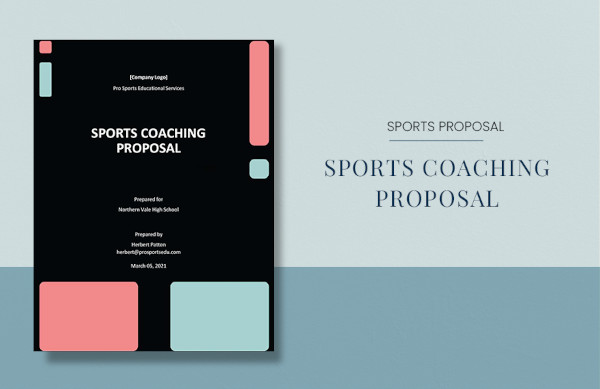
3. Sports Event Proposal Example
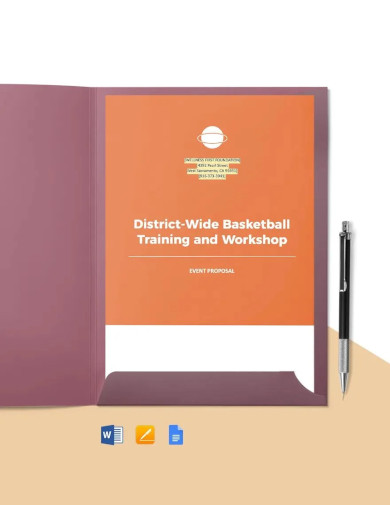
4. Sport Event Plan Example
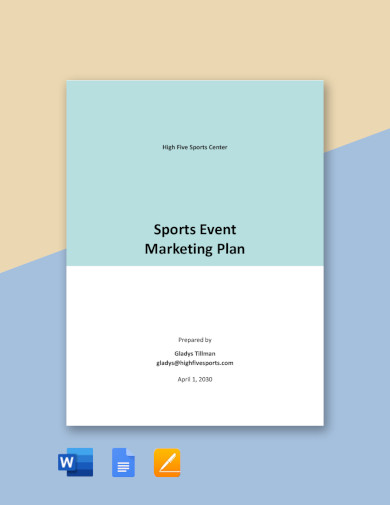
Benefits of Proposal For Sports Event
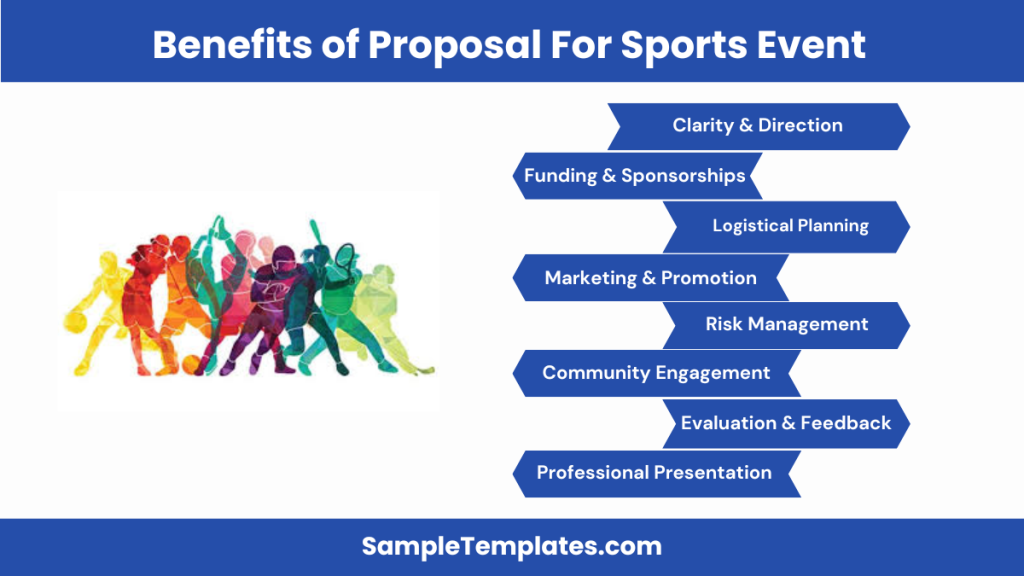
Creating a proposal for a sports event offers several key benefits, not only for the event organizers but also for sponsors, participants, and the community. Here are some of the main advantages:
- Clarity and Direction: A well-crafted proposal outlines the objectives, scope, and format of the sports event. It provides a clear direction for all involved, ensuring that organizers, participants, and sponsors are aligned with the event’s goals.
- Securing Funding and Sponsorships: A detailed proposal is essential for attracting sponsors and securing funding. It highlights the event’s value proposition, potential reach, and demographic details, making it easier to gain financial support and partnerships.
- Logistical Planning and Organization: The proposal process helps in meticulously planning out the logistics, from venue selection to scheduling and resource allocation. This thorough sample planning is crucial for the smooth execution of the event.
- Marketing and Promotion: A proposal can serve as a foundational document for marketing strategies. It identifies target audiences, key messaging, and promotional channels, which are essential for attracting participants and spectators.
- Risk Management: By addressing potential risks and outlining mitigation strategies, a proposal ensures that organizers are prepared for unforeseen circumstances, enhancing the safety and success of the event.
- Community Engagement and Impact: Proposals often include community engagement strategies and detail the event’s positive impact on the local community, such as promoting health and fitness, boosting local businesses, and enhancing community spirit.
- Evaluation and Feedback: A proposal can establish criteria for success and methods for gathering feedback, which are vital for assessing the event’s impact and identifying areas for improvement in future events.
- Professional Presentation: Presenting a professional and comprehensive sample proposal can establish credibility and demonstrate the organizers’ commitment and capability to host the event, instilling confidence in stakeholders and potential sponsors.
In summary, a proposal for a sports event is a powerful tool that facilitates planning, attracts investment, engages stakeholders, and ultimately contributes to the event’s success and sustainability.
5. Sports Event Proposal Template

6. Sports Day Proposal
How to Write a Sports Event Proposal
1. Create a Committee for the Event
The first thing to do is to invite people who are willing to volunteer as part of the sports event committee. You need a lot of help to organize a sports event, so make sure the volunteers must be dedicated to participate and organize all tasks and responsibilities for them to do so they’ll know what will be expected of them.
2. Decide on the Event Details
The next thing to do is to decide what the sports event will comprise. Know the purpose of the sports event and the reason for doing it, the aims and objectives that you want to achieve in the event, the type of sports event will you be organizing, and the sports that will be played in the event. Be clear and concise when you explain these details.
Next, provide the date, time, and location of the event. Identify which participants you want to join your event. This is important to figure out first so you can create invitations and advertisements to promote your event and sample plan the things you need for the event.
3. Plan the Logistics
The next to do is to create a list of items and supplies required for your event. List also the services you also need for the event to be successful. Once you identified the things you need, create a simple budget of the total amount of money you will need to cover the expenses and create a breakdown of each item and how much they cost. This is important to include in your proposal especially if you’re going to send the proposal to a sponsor who will help you fund the event.
4. Promote Your Event
Decide on how you will advertise and promote your event to make sure your community or school is aware of the event. You can plan on setting up a website or an event page in social media where interested individuals can register to participate, or invite teams, sports managers, university coaches, or sports personalities to participate, send out flyers, and advertise in a local newspaper.
5. Reach Out To the Participants of the Event
Weeks before the event, finalize the list of people who will participate in the event. Contact teams, referees, sports officials, athletes, etc. ahead of time to ensure they will be present in the event. Send them the details of the event so they will know what the event is about and can prepare ahead of time.
7. Sports Proposal Example
8. Proposal for Sports Event
What are the Essential Components of a Thorough Sports Event Proposal?
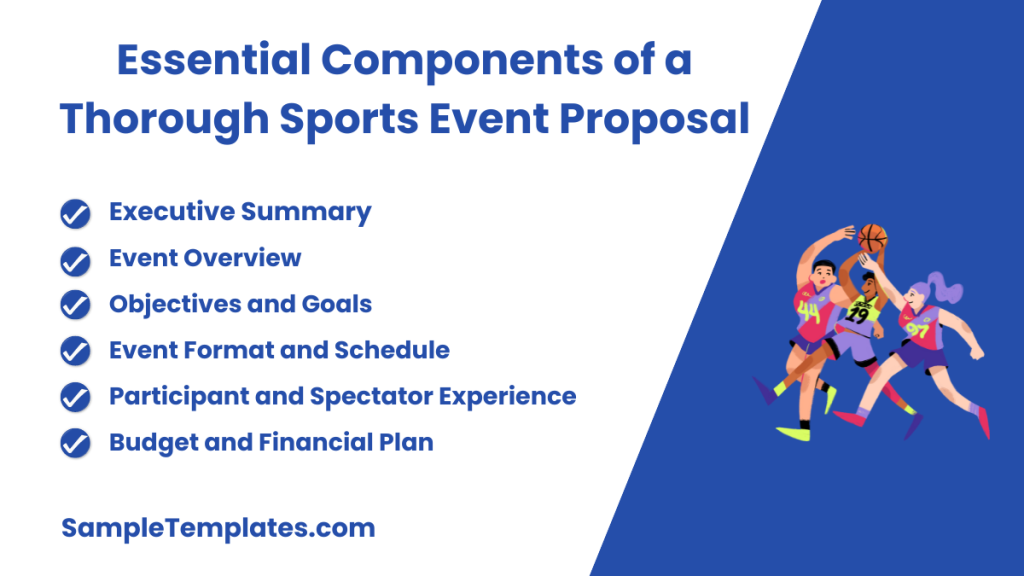
- Executive Summary: Brief overview highlighting key aspects and objectives.
- Event Overview: Detailed description of the event, including date, venue, and target audience.
- Objectives and Goals: Clear statement of the event’s purpose, objectives, and measurable goals.
- Event Format and Schedule: Outline of the event structure, including the schedule of activities and competitions.
- Participant and Spectator Experience: Plans to enhance the experience for both participants and spectators, considering engagement, entertainment, and convenience.
- Budget and Financial Plan: Detailed sample budget covering expenses, revenue projections, and sponsorship opportunities.
- Marketing and Promotion Strategy: Strategies to promote the event, attract participants, and engage sponsors and spectators.
- Sponsorship and Partnership Opportunities: Clearly defined sponsorship packages and potential collaborations with partners.
- Logistics and Operations Plan: Detailed sample plan for event logistics, including venue setup, transportation, and security.
- Risk Management and Contingency Plans: Identification of potential risks and comprehensive contingency plans to mitigate them.
- Inclusivity and Diversity Initiatives: Measures to promote inclusivity, diversity, and accessibility for participants and attendees.
- Environmental Sustainability: Strategies to minimize the event’s environmental impact and promote sustainability.
- Legacy and Community Impact: Plans to leave a positive and lasting impact on the community, including infrastructure development and community engagement programs.
- Evaluation and Measurement: Criteria and methods for assessing the event’s success against predetermined goals and objectives.
- Supporting Documents: Any additional documents, such as letters of support, endorsements, or relevant permits, that strengthen the proposal.
9. Sports Proposal Sample
10. Sample Program for Sports Event
How Do you write a Sports Proposal for School?
To craft a school sports proposal, start with a concise introduction highlighting the proposed sample event, its objectives, and benefits. Provide essential details like event type, date, and venue. Outline the sports involved, emphasizing inclusivity. Present a budget overview, detailing expenses and potential revenue sources. Describe your promotional strategy to garner interest and support. Address logistics, including staffing and safety measures. Emphasize educational and community engagement aspects, showcasing the event’s positive impact on participants. Conclude with a call to action, inviting school support and participation. Keep the proposal clear, organized, and tailored to resonate with school values and objectives.
11. Sample Sports Event Proposal
12. Sports Event Program Partnership Proposal
How Do you Create a Sporting Event?
- Define the Purpose and Goals: Clearly articulate the purpose of the sporting event and establish specific goals. Determine whether it’s a competitive tournament, charity event, community-building initiative, or a combination of these.
- Select a Sport and Format: Choose the sport(s) that align with your event’s goals. Decide on the format, such as single-elimination, league-style, or a combination of different sports.
- Identify the Target Audience: Define your target audience, considering participants, spectators, and potential sponsors. Tailor your event to meet the interests and needs of your chosen demographic.
- Choose a Date and Venue: Select a suitable date for the event, considering the sports calendar, local events, and potential weather conditions. Secure a venue that accommodates the chosen sports and anticipated attendance.
- Create a Budget: Develop a detailed sample budget outlining expenses and potential revenue streams. Consider costs such as venue rental, equipment, staff, marketing, and any necessary permits.
- Sponsorship and Funding: Seek sponsors and funding sources to support the event. Create attractive sponsorship packages that offer value to potential sponsors in exchange for financial or in-kind support.
- Event Logistics: Plan the logistics of the event, including equipment needs, staffing requirements, security measures, and any necessary permits or insurance.
- Marketing and Promotion: Develop a comprehensive marketing and promotion strategy to create awareness and attract participants and spectators. Utilize social media, traditional media, and community outreach to maximize exposure.
- Registration Process: Set up a user-friendly registration process for participants. Utilize online platforms to streamline registration, payment, and communication with participants.
- Event Day Execution: Coordinate all aspects of the event on the day, including setup, participant registration, officials and staff management, and addressing any unexpected issues.
- Engage the Community: Foster community engagement by involving local businesses, schools, and organizations. Encourage spectators to attend and create a sense of community around the event.
- Post-Event Evaluation: Evaluate the success of the event by analyzing attendance, participant feedback, and financial outcomes. Identify areas for improvement and gather insights for future events.
By carefully planning and executing these steps, you can create a successful and memorable sporting event.
13. Club Sports Event Committee Proposal Form
14. Sports Event Development Proposal
How Do you write a Sports Event Plan?
Writing a sports event plan involves several key steps. Here’s a guide to help you create a comprehensive sports event plan:
1. Title Page:
- Include the event name, date, venue, and a visually appealing design to make the plan stand out.
2. Executive Summary:
- Provide a brief overview of the sports event plan, highlighting its objectives, key features, and anticipated outcomes.
3. Event Overview:
- Describe the purpose of the event, its goals, and the overall vision. Specify the type of sports to be featured and any unique aspects that set the event apart.
4. Target Audience:
- Identify the primary audience, including participants, spectators, and potential sponsors. Tailor the event plan to meet the needs and interests of this demographic.
5. Objectives and Goals:
- Clearly outline the specific objectives and goals of the sports event, covering both quantitative and qualitative targets.
6. Event Format and Schedule:
- Detail the format of the event, including the structure of competitions, schedule of activities, and any associated ceremonies or entertainment.
7. Venue Information:
- Provide information about the chosen venue, including its capacity, facilities, and any special considerations. Include maps or diagrams if necessary.
8. Budget:
- Develop a comprehensive budget that outlines expected expenses and potential revenue streams. Consider costs such as venue rental, equipment, marketing, staffing, and permits.
9. Sponsorship and Funding:
- Outline your strategy for securing sponsors and funding. Present attractive sponsorship packages that offer value to potential sponsors in exchange for their support.
10. Marketing and Promotion:
- Detail the marketing and promotion plan, including advertising channels, social media strategies, partnerships, and promotional events leading up to the main event.
11. Logistics and Operations:
- Describe the logistical details, such as equipment needs, staffing requirements, security measures, and any permits or licenses required.
12. Risk Management:
- Identify potential risks associated with the event and outline strategies for risk mitigation. Include contingency plans for unforeseen circumstances.
13. Participant Registration:
- Explain the process for participant registration, including online platforms, deadlines, and any required documentation.
14. Community Engagement:
- Outline initiatives to engage the local community, involve schools or organizations, and create a sense of excitement and support for the event.
15. Evaluation and Metrics:
- Define the criteria for evaluating the success of the event. Include key performance indicators (KPIs) and a plan for post-event evaluation.
16. Timeline:
- Create a detailed timeline that covers pre-event preparations, the event day, and post-event activities.
17. Appendix:
- Include any supporting documents, such as maps, permits, letters of support, or detailed financial breakdowns.
By following these steps and providing detailed information in each section, you can create a thorough and effective sports event plan.
15. Sports Event Services Proposal
FAQs
What are Sports Events?
A sporting event is an athletic activity that requires physical skill and athletic prowess. A lot of sporting events usually involve competition that has a set of rules provided by a recognized sanctioning body or by an organization engaged in the development and promotion of sports activities.
What are major sporting events?
Major sporting events include the Olympics, FIFA World Cup, Super Bowl, Wimbledon, and the Tour de France. These global competitions attract top athletes and immense viewership, showcasing exceptional athletic prowess.
What are the three types of sports?
Different types of sports are available nowadays but the three main categories of sports are individual sport, dual sport, and team sport.
Which sport is the most-watched in the world?
Soccer is the most-watched sport in the world. There are around 3.5 billion fans of soccer all around the world.
What are the most popular sports?
The most popular sports around the world are football, cricket, hockey, tennis, volleyball, table tennis, basketball, and baseball.
Once you’re done writing the draft of your simple proposal, go through all the details in the proposal with your committee co-members so they will understand how the event will proceed and even give suggestions on how to improve the event and the proposal. Make sure the proposal is clear and concise enough for your reader to understand it. If you’re about to write the proposal, you can download our free sample templates above to use as your guide!
Related Posts
FREE 20+ Event Program Samples
FREE 18+ Sample Event Proposals
FREE 17+ Sample Sponsorship Proposal
FREE 14+ Event Marketing Plan Templates
FREE 11+ Photography Proposal Templates
FREE 10+ Club Action Plan Samples
FREE 9+ Sample Proposal
FREE 9+ Sponsorship Proposal Samples
FREE 9+ Event Operational Plans
FREE 8+ Sponsorship Letter Templates
FREE 30+ Sample Event Proposal
FREE 27+ Sports Flyer Templates
FREE 12+ Event Budget Proposal Templates
FREE 10+ Event Action Plan Samples
FREE 10+ Sample Event Proposal Letter
